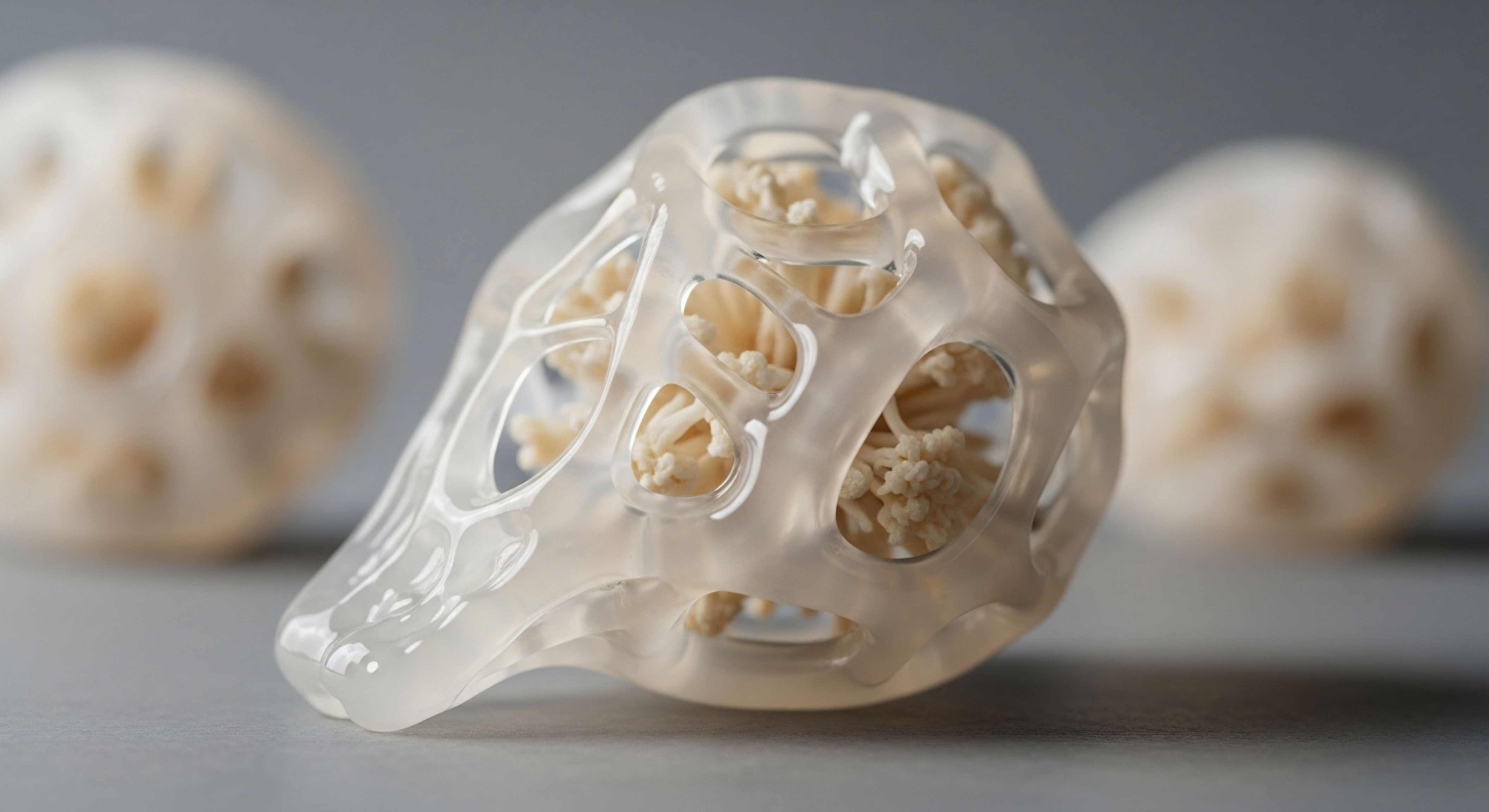

The Slow Erosion of Human Signal
Elite performance is a matter of biological signaling. Your drive, your recovery, and your cognitive clarity are governed by a precise cascade of hormonal instructions. With time, the fidelity of this signal degrades. This is a systems-level reality.
The endocrine system, the master regulator of your physical and mental state, begins to transmit its instructions with less precision and lower amplitude. This degradation is the primary driver behind the loss of competitive edge, the accumulation of stubborn body fat, and the mental fog that dulls executive function.
The body’s key hormones directly influence an athlete’s composition, metabolism, energy, and recovery. Testosterone, a primary driver of muscle mass and bone density, declines predictably with age. Growth Hormone (GH), essential for stimulating cell repair and protein synthesis, follows a similar downward trajectory. Simultaneously, catabolic signals like cortisol can become dominant, actively breaking down muscle tissue and hindering performance. This creates a hostile internal environment for anyone demanding peak output from their body and mind.
A meta-analysis of 14 randomized controlled trials found that androgen replacement therapy produces statistically significant improvements in both executive function and memory in hypogonadal men.
This decline is a slow, creeping erosion of the very chemistry that defines your capacity for high performance. It is a loss of cellular instruction, leading to slower repair, diminished strength gains, and a compromised ability to handle stress. The goal of hormone recalibration is to restore the integrity of these signals, upgrading the body’s internal communication network to support elite output.


The Precision Endocrine Upgrade
Recalibrating your hormonal landscape is a process of precise, data-driven intervention. It involves supplying the body with the exact molecular keys it needs to unlock dormant pathways for growth, recovery, and cognitive sharpness. This is accomplished through two primary vectors ∞ restoring foundational hormone levels and introducing specialized signaling molecules known as peptides.

Foundational Hormone Restoration
The primary focus here is the restoration of key androgens and growth factors to optimal physiological ranges. Testosterone Replacement Therapy (TRT) is a well-established protocol for correcting deficiencies that directly impact muscle mass, libido, and mental acuity. Restoring testosterone levels can significantly improve muscle growth, strength, and recovery rates in individuals with diagnosed deficiencies. The cognitive benefits are also pronounced; studies demonstrate that normalizing testosterone improves executive function, spatial memory, and verbal memory.

Peptide-Driven Cellular Instruction
Peptides are short-chain amino acids that act as highly specific signaling agents, instructing cells to perform targeted tasks. Unlike foundational hormones that have broad effects, peptides can be used to issue precise commands, such as accelerating tissue repair or stimulating the release of endogenous growth hormone.
This targeted approach allows for a level of precision that is a significant evolution in performance medicine. Key peptides used in performance protocols include:
- BPC-157 ∞ Known for its systemic tissue-regenerative properties, BPC-157 can accelerate the healing of muscle, tendon, and ligament injuries by promoting blood flow and cellular repair.
- TB-500 (Thymosin Beta-4) ∞ This peptide supports cellular regeneration and reduces inflammation, leading to faster recovery from intense training and quicker healing of soft tissue damage.
- CJC-1295 & Ipamorelin ∞ This combination stimulates the pituitary gland to release the body’s own growth hormone in a natural, pulsatile manner. This enhances protein synthesis, accelerates recovery, and improves body composition without the side effects of synthetic GH administration.
By combining foundational hormone restoration with targeted peptide protocols, it is possible to systematically upgrade the body’s capacity for repair, adaptation, and high-level performance.


The Threshold for Proactive Intervention
The determination to recalibrate is made at the intersection of subjective experience and objective data. The pervasive sense of lost edge, persistent fatigue, or a plateau in physical progress are valid indicators. These qualitative feelings are often the first sign that your internal biology is no longer supporting your performance ambitions. Waiting for a clinical diagnosis of “deficiency” is a reactive posture; the proactive stance is to intervene when your system shifts from optimal to merely adequate.

Identifying the Intervention Point
A comprehensive blood panel is the definitive tool for assessing your endocrine status. Key biomarkers provide a quantitative look at your hormonal signaling and metabolic health. The decision to intervene is typically based on:
- Sub-Optimal Hormone Levels ∞ This includes not just total testosterone but, more critically, free testosterone, SHBG (Sex Hormone-Binding Globulin), estradiol, and IGF-1 (Insulin-like Growth Factor 1). Levels may be within the statistically “normal” range but fall far short of the optimal range required for elite performance.
- Persistent Performance Plateaus ∞ When training, nutrition, and recovery are meticulously managed, yet progress in strength, endurance, or body composition stalls.
- Degraded Recovery Capacity ∞ An increase in DOMS (Delayed Onset Muscle Soreness), nagging soft-tissue injuries, and a general feeling of being unable to recover between high-intensity sessions.
- Cognitive Decline ∞ A noticeable drop in focus, mental sharpness, motivation, and the ability to perform complex cognitive tasks under pressure.
Peptide therapies are linked with enhanced muscle protein synthesis, leading to improved gains in muscle mass and strength.
The timeline for results varies by the intervention. With TRT, subjective improvements in energy and libido can be felt within weeks, while changes in body composition and strength become apparent over several months. Peptide protocols for injury repair, such as BPC-157, can yield noticeable improvements in pain and function in a matter of weeks. Growth hormone secretagogues typically require 3-6 months of consistent use for significant changes in body composition and recovery to manifest.

Your Biological Prime Is a Choice
The passive acceptance of age-related decline is a relic of a previous medical paradigm. The modern understanding of endocrinology and cellular signaling provides the tools to manage and direct the systems that govern performance. Your hormonal profile is a dynamic system, responsive to precise inputs.
Recalibration is the conscious decision to stop drifting with the biological current and to begin engineering the outcome. It is the application of rigorous science to reclaim your physical and cognitive sovereignty, making your peak state a matter of deliberate action.



